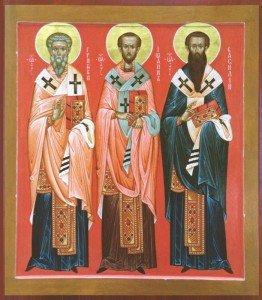 As I shared in the last issue of the Eastern Herald, early Christians, once they became convinced that Jesus was truly more than just a man, had to tackle the idea of Who God Is. Just as they had to come up with words to express how Jesus Is truly God and truly man, they had to find the right words to express how God and Jesus could also be ONE. I think that what I have already shared gives my readers a flavor of the struggle that transpired. The majority of the Fathers of the Church, especially the Greek Fathers found that what priests like Arius and Nestorius were teaching about Jesus, just did not seem right. As the fights escalated, the Emperor, who at that time was seen as the head of both the Church and State, called bishops and priests together and told them to figure out what the real truth is. The Council of Nicaea was the first attempt to hammer out an agreement about Who Jesus, the Christ, is.
As I shared in the last issue of the Eastern Herald, early Christians, once they became convinced that Jesus was truly more than just a man, had to tackle the idea of Who God Is. Just as they had to come up with words to express how Jesus Is truly God and truly man, they had to find the right words to express how God and Jesus could also be ONE. I think that what I have already shared gives my readers a flavor of the struggle that transpired. The majority of the Fathers of the Church, especially the Greek Fathers found that what priests like Arius and Nestorius were teaching about Jesus, just did not seem right. As the fights escalated, the Emperor, who at that time was seen as the head of both the Church and State, called bishops and priests together and told them to figure out what the real truth is. The Council of Nicaea was the first attempt to hammer out an agreement about Who Jesus, the Christ, is.
After Nicaea, Basil of Caesarea, became one of the Fathers who contributed greatly to the development of Pro-Nicene theology. He presents an excellent example of the complex process of theological development and intra-ecclesial accommodation that was central to the emergence of fully pro-Nicene theologies. In some accounts Basil is the architect of the pro-Nicene triumph: he carries forward the Nicene torch long held by Athanasius, holds together different pro-Nicene factions, and develops an account of the distinctions between persons and essence of such power that the final victory of pro-Nicene theology under the Emperor Theodosius is truly inevitable. For others the victory of pro-Nicene theology in the 380s is largely the result of secular political moves, the work of Basil being of little or no importance. The truth lies somewhere in between: Basil’s theological and ecclesio-political work was of importance, but he was one of many architects of pro-Nicene theology. At the same time the accession of Theodosius in 379 was nothing if not providential for pro-Nicenes.
I would like to share over the next several weeks, Basil’s contributions to the development of a truly pro-Nicene theology. Why? Because Basil is one of the great Greek Fathers of our Church and someone who greatly influenced our Eastern Christian faith and spirituality. He is one of the Cappadocian Fathers and someone about whom every Eastern Christian should know.
